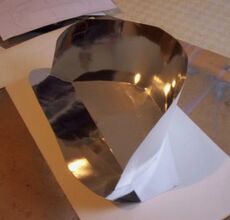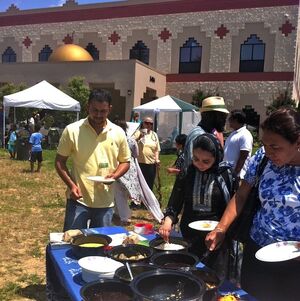|
Last edited: 16 December 2019
|

Early prototype of the CooKit solar panel cooker variation by Matthew Rollins
- November 2013: Lady Fatemah Trust finances several thousand solar cookers for Iraq, Lebanon, and Africa - A.G. Karim, chairman of The Lady Fatemah Trust, based in the United Kingdom, has agreed to finance several thousand solar cookers designed by Matthew Rollins of Applied Green Technology, to be delivered to Africa, Iraq, and Lebanon. Matthew has also arranged for Andreas Fasoulides, living in Cyprus, to visit Pakistan to lay the ground work for future solar cooking training workshops, to enable them to supply 100,000 solar cookers currently on provisional order. He also wants to explore sales possibilities in Latin America. Matthew is close to releasing his new solar cooker design developed from the basic CooKit solar panel cooker. It will feature the ability to be able to be adjusted to suit sun orientation at any latitude location on the globe. He states that with the ability to better gather and focus the light, it can often be used without the need for a cooking bag, subject to weather conditions.
- June 2013: Cranfield University working with Comsats University on solar cooker - The solar cooker was developed by COMSATS Institute of Information Technology, Islamabad, with expertise from Cranfield University. It was funded by the government of Pakistan, who recognized the need to improve the lives of those living in the remote regions of Pakistan. As well as heating food, the cooker is able to store heat, and could generate electrical power for essential mobile communications or air conditioning. It will be exciting to learn more.

The three Solar Cooker made by Usman Institute students.
- April 2013: Usman Institute of Technology students Neel Kumar, Sajid Nawaz, Zaid Bin Asharf, Talha Farooqi, Noureen Fatima) have made three solar cookers, a solar box cooker, a CooKit, and a parabolic solar cooker. All three cookers are working perfectly. These students have cooked rice and pulao as well as heated water for tea using these solar cookers.

Sampling solar cooked lentils, rice, potatoes, eggs, mixed vegetables, dal, popcorn, tea, and for dessert, chocolate, yellow, lemon and spice cakes at the Dar al Noor Mosque, July 2011.
- July 2011: Solar Cooking Expo at Northern Virginia Mosque - Solar cooking in Islamic countries is on the rise, but its wide-spread acceptance as a significant way to reduce the damage caused by smoky cooking fires will need greater support from the international development agencies. Solar Cookers International (SCI) board member Patricia McArdle and Afzal Syed of the Dar al Noor Mosque congregation contributed to this goal by hosting a well-attended solar cooking demonstration at Syed's mosque in Manassas, Virginia on Saturday July 9. Solar Household Energy co-founder Louise Meyer and two SHE volunteers from Washington DC also participated in this event. A popular DC radio show interview with McArdle about her novel Farishta two days before the event, drew large crowds from around the northern Virginia/DC metro region. Visitors sampled a variety of traditional and modern foods (lentils, rice, eggs, spiced potatoes, mixed vegetables, dahl, popcorn, chai tea--and for dessert, chocolate, yellow, lemon and spice cakes) all of which were baked, boiled, fried and roasted in the many solar cooker models on display. McArdle also demonstrated a StoveTec rocket stove and a retained-heat cooking basket in her integrated cooking method display. Members of the Dar al Noor Mosque community and other Muslim visitors told McArdle that solar cooking technology would be an extremely useful addition to the cooking devices currently used by people in their sun-drenched, fuel-starved home countries, including Pakistan, Morocco, Afghanistan, Nigeria, Egypt, Yemen, Somalia, Sudan and by Darfur refugees in Chad. The event was initially proposed by Mr. Syed, a member of the Dar al Noor community, who attended a January 2011 solar cooking demonstration at the UN in New York, organized by SCI board member AJ Lederman and hosted by SCI Executive Director AmyJo Mattheis. Soon after seeing that exhibit, Mr. Syed traveled to his home country with several Cookits, which he demonstrated to amazed friends and neighbors in Pakistan. Mr. Syed and his family are convinced that the widespread introduction of solar cooking technology in Pakistan could dramatically reduce the quantities of firewood, charcoal and LPG that are currently consumed at great expense and with serious environmental costs. The many visitors attending the Dar al Noor Mosque solar cooker exhibit agreed, as does McArdle, who has served for the past six months as a solar cooking expert on the Global Alliance for Clean Cookstoves Fuel and Technology working group. McArdle is continuing with her efforts to convince the GACC and the U.S. Department of Energy to give as much support to R&D for solar thermal cooking technology as they are currently devoting to the improvement of wood burning fuel efficient stoves ($12.5 million). Dar al Noor mosque leaders said they would like to host another solar cooking demonstration next year. Under clear blue skies and with large enthusiastic crowds attending the event, Mr. Syed and the solar cooking team were convinced that they had accomplished their goal of spreading the word about solar cooking to a whole new audience.
- March 2011: Homemade hardboard solar box cooker costs less than Rs100 - A Pakistani-born American citizen is keen to introduce the technology of homemade, non-patent and cheaper solar box cooker in the rural areas of Pakistan. “I have come here to show the world’s cheapest solar box cooker, a simple technology using sunlight to cook plain rice, prepare lentils and other foods on daily basis in a covered casserole,” said Pakistani expatriate Afzal Syed in an exclusive interview on Sunday. Syed is also a volunteer associated with a non-profit American organization, Solar Cookers International (SCI). He said the hardboard CooKit panel cooker could be made at home at a cost of less than Rs100. Read the article - Pakistan Today
- January 2011: The flood affected Pakistani people of Swat received solar-powered energy generators for electricity and solar-powered cooking equipment, funded by a leading Berlin-based non-governmental organization, German Aid for Afghan Children (GAAC). The organization has begun a one million Euros worth relief and reconstruction work in the Khyber Pakhtunhwa's districts worst hit by floods. GAAC had announced in 2010 the distribution of solar-powered lithium-ion batteries to generate electricity and solar cooking equipment for the planned 1000 families of Swat, Nowshera, Pabbi and Bannu districts.
- October 2010: FDA trains 2260 youth, 1500 women under various skills, vocational development program. Governor Owais Ghani, while appreciating the overall achievements, emphasized the need for expanding the scope of these programs particularly the output of Women Skills Development Centers, adding that these efforts would lead towards youth and women empowerment through skills development providing them the opportunity to earn reasonable livelihood. The Governor issued directives for adding more common and value added trades in these programs. He said that funds availability should be ensured and efforts must be made to make the inactive Women Skills Development Centers functional. The Governor particularly referred to the solar cooking technology and wished that this should be included in the training curricula of Women Skills Development Centers.
- August 2010: In the wake of recent flooding in Pakistan, German Aid for Afghan Children (GAAC) has increased it's aid efforts by providing building materials for new housing, and some simple prefabricated shelters. The houses will include solar powered lithium-ion batteries, generating electricity for the family living in the house, and also solar cooking equipment, which will ease the difficulty of cooking foods. This will help prevent further deforestation, as residents struggle to find cooking fuel. German NGO launches relief work in Pakistan - The Daily Mail
- January - December 2009: The GEF Small Grants Programme is funding a project by the Al-Qaim Women Development Organization where traditional three stone stoves are replaced with 30 solar cookers in 30 households
- January 2009: Terry Elliott reports: We gave a demonstration of solar cooking to Garden City Rotary club. They are keen to use this fuelless method used , and they will be kicking off the idea in a small village close to Sylhet. There is also some interest in supporting some of the Baroudha projects. They took us to lunch (the hospitality has been outstanding) to a Chinese restaurant. We were interrupted by a TV camera crew filming us from all angles. And me without a shave! After I had followed my dream and made it to the top after X Factor, my one worry was the intrusion of the media into my private life. I like tried to cover my face but they go 'nah, Ken, just gives a bit of leg'. Terry wishes now that had hadn't agreed to let Hello magazine photograph his house. The perils of celebrity! Max Clifford did warn me. It appears that Rotary thought that the joint venture was newsworthy. If it is accepted, it certainly will be. The improbability of cooking using only the power of the sun and a bit of cardboard and tinfoil seems close to that of Gulliver's Lilliputians generating sunlight from cucumbers. We left to the usual crowds, applause, lights and traffic jams.I can almost smell the greasepaint!
- July 2003: The core objective of the Building and Construction Improvement Programme (BACIP), a project of the Aga Khan Planning and Building Services, is to "consider and promote the measures related to the habitat of the desolate communities of the Karakoram, Hindukush and Himalayan mountain villages in Northern Areas and Chitral of Pakistan, and enable these communities to be transformed into a healthy living built environment through sustainable improvements." To that end, BACIP produces a number of energy efficient and renewable energy-power products, including a new line of solar box cookers. After intensive research on radiation intensity and weather conditions of northern Pakistan, three solar cookers were developed, ranging in size from 25 inches long by 21 inches wide to 31 inches long by 25 inches wide. Costs are expected to be US $30-40 each. According to Professor Nadeemullah Khan, a BACIP consultant, many surveyed families indicated the need and demand for such products in this energy-scarce region. Construction materials were selected based on performance and local availability. The design allows for easy replacement of glass if damaged. Contact: Nadeemullah Khan


